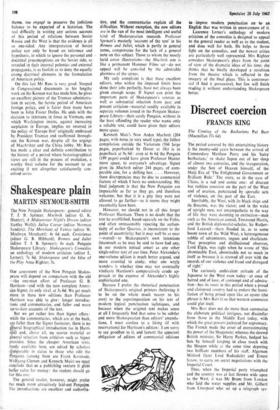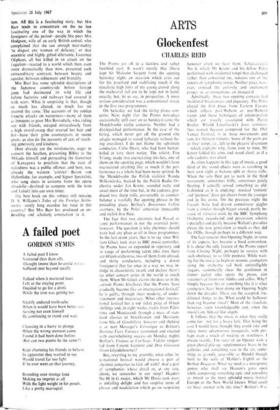Discreet coercion
FRANCIS KING
The period covered by this entertaining history is the twenty-odd years between the arrival of Commodore Matthew Perry and his 'hairy barbarians,' to shake Japan out of her sleep of almost two centuries, and the inauguration, under the Son of Heaven himself, of the Meiji Era of 'The Enlightened Government or Brilliant Rule.' The story, as in the case of China, is a sad and comic one: of discreet but ruthless coercion on the part of the West and of evasion, punctuated by sporadic acts of violence, on the, part of the East.
Inevitably, the West, with its black ships and its. .firearms, was the victor; and in the wake of upright men, not unsympathetic to the way of life they were dooming to extinction—men such as the American consul, Townsend Harris, and the British diplomatist-scholar, Sir Ruther- ford Laycock—there flooded in, as to some boom town of the Wild West, a heterogeneous rabble of adventurers, rogues and charlatans. That perceptive and disillusioned observer, Lord Elgin, was right when he wrote of 'this abominable East, abominable not so much in itself as because it is strewed all over with the records of our violence and fraud and disregard of right.'
The curiously ambivalent attitude of the Japanese to the West even today—at once of hatred and of love, of contempt and of admira- tion—has its roots in this period when a proud and cloistered country had to endure the humi- liation of being prised open like an oyster (the phrase is Mrs Barr's) so that western commerce could glut itself.
Mrs Barr does not do more than summarise the elaborate political intrigues, not dissimilar from those in the Middle East today, with which the great powers jockeyed for supremacy. The French made the error of overestimating the power of the Shogunate; whereas the shrewd British minister, Sir Harry Parkes, hedged his bets by himself keeping in close touch with the Shogun while at the same time deputing two brilliant members of his staff, Algernon Mitford (later. Lord Redesdale) and Ernest Satow, to carry on secret negotiations with the Imperial Court.
Thus, when the Imperial party triumphed and the country was at last thrown wide open to the West, it was Mr Brunt from London who laid the water supplies and Mr. Gilbert from Liverpool who set up a telegraph sys- km. All this is a fascinating story; but Mrs Barr tends to concentrate on the no less fascinating one of the way in which the foreigners of the period—people like poor Mrs Hodgson, wife of an early British consul, who complained that she saw enough near-nudity 'to disgust any woman of delicacy,' or that eccentric and highly gifted dilettante, Laurence Oliphant, all but killed in an attack on the Legation—reacted to a world which then, even more dramatically than now, presented such extraordinary contrasts between beauty and squalor, between refinement and brutality.
Mrs Barr has some splendid descriptions of the Japanese countryside before foreign guns had decimated its wild life and before factories and railways had covered it with scars. What is surprising is that, though so much has altered, so much has re; mined the same. The accounts of the sudden frenetic attacks on westerners—many of them as innocent as poor Mrs Borrodaile, who, riding out with friends, escaped miraculously from a high sword-sweep that severed her hair and hat—have their grim counterparts in recent years; as also do the accounts of acts of touch- ing generosity and kindness.
Here already are the missionaries, eager to convert the heathen, presenting Bibles to the Mikado himself and persuading the Governor of Kanagawa to proclaim that the state of nakedness was a public offence; and here, too, already the western 'artistes'—Baron von Hohenlohe, for example, and Signor Spectalirii, who sang duets in costume from the opera Strodella—destined to compete with the koto and kabuki into our own times.
The best book on this subject still remains IL S. Williams's Tales of the Foreign Settle- ments—surely long overdue for issue in this country? But Mrs Barr has produced an en- thralling and scholarly companion to it.































 Previous page
Previous page